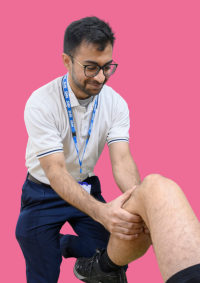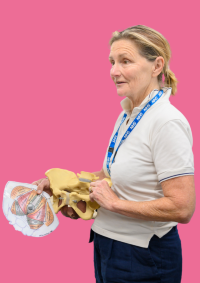- Overview
- Available Locations
- How do I access this service?
- Contact us
- Meet the team
- Useful resources and links
Type
Adult Services - MSK Physiotherapy & APP'sPhysiotherapy takes a whole-person approach to improving your physical health.
At NHFT we support people affected by injury, illness, pain or disability to help restore their movement, strength, function and independence.
Our aim is to help you get back to being you as quickly as possible.
Physiotherapy works best when you are actively involved in the formulation of your management plan. This helps our experienced physiotherapists to best understand your situation and what you would like to achieve so that we can provide you with personalised information, lifestyle advice and exercise recommendations to help you achieve your goals.
Who is this service for? Adults and young people aged 12 years old or older, requiring assessment, diagnosis and treatment for musculoskeletal conditions.
Available Locations
- MSK Physiotherapy - Danetre Hospital, Daventry
- MSK Physiotherapy - Highfield Clinical Care Centre, Northampton
- MSK Physiotherapy - Isebrook Hospital, Wellingborough
- MSK Physiotherapy - Lotus House, Northampton
- MSK Physiotherapy - Nene Park Outpatients Clinic, Irthlingborough
- MSK Physiotherapy - Nuffield Diagnostic Centre, Corby
- MSK Physiotherapy - St Mary's Hospital, Kettering
- MSK Physiotherapy - Weston Favell Primary Care Centre, Northampton
How do I access this service?
You can register with us directly by completing our simple online self-referral form. This is for all musculoskeletal problems except where they relate to:
- your neck or back
- your hands/wrists or feet
- women's pelvic health-related issues such as ante- and post-natal back or pelvic pain, rectus diastasis, bladder or bowel dysfunction (see the pelvic health section on this page for further information)
If your symptoms relate to any of the above conditions, you will need to ask your GP practice to refer you to us.
Before completing our self-referral form for MSK Physiotherapy, please try our easy-to-use online symptom checker to get a better understanding of your problems and find out what you can do to manage your symptoms.
Complete the online MSK Physiotherapy symptom checker
Please note that all referrals are prioritised based on clinical need. Any referrals deemed non urgent will be placed on a waiting list and seen as the next routine appointment becomes available.
Complete the online MSK Physiotherapy self-referral form
First-Contact Physiotherapy clinics
As an alternative to self-referral, our physiotherapists also work with some GP surgeries in Northamptonshire to provide First Contact Physiotherapy (FCP) clinics.
These clinics are for people who have contacted their GP practice for an appointment for a musculoskeletal problem. Instead of needing to see a GP, they can be booked in directly to see one of our specialist physiotherapists. All patients are seen within 5 working days. Our FCP clinics are available at the following GP practices:
- Abington Medical Centre, Northampton
- Abington Park Surgery, Northampton
- Greenview Surgery, Northampton
- King Edward Road Surgery, Northampton
- Leicester Terrace Health Centre, Northampton
If your GP practice is not listed above you can ask the practice to see their own first-contact physiotherapy clinician, if they have one, or you can continue with a self-referral.
Other ways to self-refer to MSK Physiotherapy
You can also refer yourself to the MSK Physiotherapy service by using our printable self referral form.
Download the printable MSK Physiotherapy self-referral form
Send your completed form to our Patient Contact Centre by emailing patientcontactcentre@nhft.nhs.uk or by printing and posting it to the following address:
NHFT Patient Contact Centre
Lotus House
Victoria Street
Northampton
NN1 3NR
Contact us
Please contact the NHFT Patient Contact Centre for any enquiries relating to:
- Booking, cancelling or rescheduling appointments
- Questions for your physiotherapist
Phone: 0330 555 6789
Email: patientcontactcentre@nhft.nhs.uk
Please note: The Patient Contact Centre is unable to accept self-referral requests by telephone. Please go to our 'How do I register for this service?' section for information on how to self-refer.
Meet the team
We have seven teams spread out across the county.
Each team consists of:
- Admin support
- Physiotherapy assistants
- Physiotherapists
- Advanced Physiotherapist Practitioners
Each team consists of physiotherapists with a wide range of specialist interests, genders and ages.







